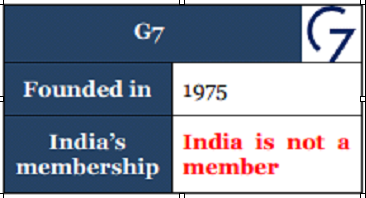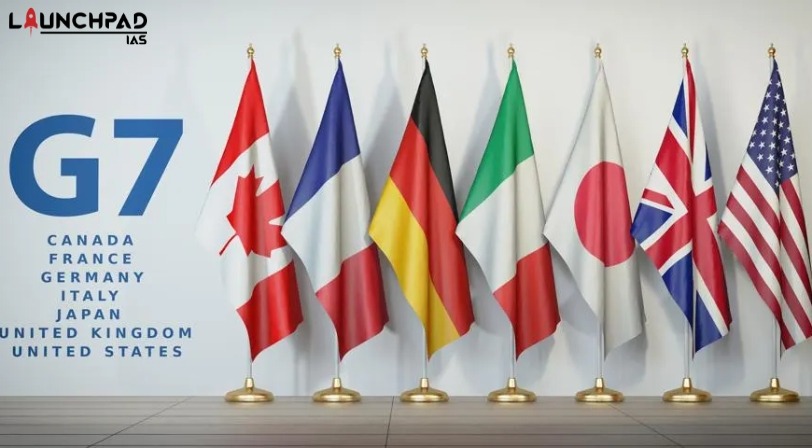Organisational Structure

- G7 is an intergovernmental economic group of 7 largest advanced economies such as Canada, France, Germany, Italy, Japan, the UK, and the US.
- EU is also represented within the G7 as an invitee.
- These countries are the seven major advanced economies as reported by the IMF.
- Formerly called G8 with Russia in it, but due to the Crimean crisis, Russia
was ejected from the group. - The organization was founded to facilitate shared macroeconomic initiatives by its members in response to the collapse of the exchange rate in 1971.
- The G7 summit is held annually to discuss economic policies, while the G7 finance ministers meet after 6 months.
- For the first time in the last 44 years, the Gender Equality Advisory Council was set up.
- The council aims to convince private sector companies to set up such a council and eradicate the problem of gender inequality from the root.
- It carries out its mandate advising the G7 Presidency and recommending concrete actions for the G7 to advance gender equality and women’s empowerment across all areas of the G7’s work.
G7 Summit
- The heads of these countries hold an annual G7 summit with the European Union and other invitees.
- India was invited to the 2021 G7 summit as a special guest.

- The presidency of G7 meetings is held by each of the seven countries in turn, each year. The country holding the presidency is responsible for organising and hosting the meeting.
- Japan holds the G7 presidency for 2023.
- Nature – Together the member countries represent 40% of global GDP and 10% of the world’s population.
- Unlike other bodies such as NATO, the G7 has no legal existence, permanent secretariat or official members.
- It has no binding impact on policy, and all decisions and commitments made at G7 meetings need to be ratified independently by governing bodies of member states.
Recent Developments
- Communique– The G7 leaders adopted a communique to jointly defend universal human rights and democratic values, the rules-based multilateral order and the resilience of democratic societies.
- Ukraine– The G7 leaders re-emphasised their condemnation of Russia’s illegal and unjustifiable war of aggression against Ukraine.
- G7 countries have pledged and provided EUR 28 billion in budget aid and are strongly committed to supporting Ukrainian reconstruction through an international reconstruction plan.
- Energy and food security– The G7 leaders committed to phase out our dependency on Russian energy.
- They ensured to secure the energy supply and reduce price surges by exploring additional measures such as price caps.
- The G7 countries will also increase global food and nutrition security through the Global Alliance on Food Security.
- Investment – The G7 countries have launched the Partnership for Global Infrastructure and Investment (PGII), a joint initiative to fund infrastructure projects in developing countries.
- Building on their existing partnership with South Africa, G7 will work towards new Just Energy Transition Partnerships with Indonesia, India, Senegal and Vietnam.
- Climate and the environment- The G7 leaders endorsed the goals of an international Climate Club to accelerate the implementation of the Paris Agreement.
- India and G7 – India has been a special guest of the G-7 since 2003. It has maintained its independent course, especially on political issues.
- The G7 condemned “rising authoritarianism”, net shutdowns, manipulation of information, and rights violations.
- These are areas the Indian government has often been criticised for in recent years.
- However, India signed off on the joint statement by G-7 and guest countries on “open societies.”
- G7 Global Corporate Tax Deal – G7 countries have backed the proposal to impose a common global corporate tax.
- The tax proposal endorsed by the G7 countries (US, UK, Germany, France, Canada, Italy and Japan) has two parts.
- The agreement made will be discussed in detail at the upcoming meeting of G20 financial ministers and central bank governors.
- First part – Countries around the world should tax their home companies’ overseas profits at a rate of at least 15%.
- Second part – This allows countries to tax a share of the profits earned by companies “that have no physical presence but have substantial sales.”


